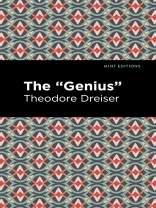The “Genius” (1915) is a novel by Theodore Dreiser. Based partly on his own experience as an artist from the Midwest, The “Genius” examines the nature of talent, the difficulty of desire, and the meaning of faith itself. Although he had high hopes for the novel, reviews were mixed, and sales suffered due to charges of obscenity. Some critics, however, praised Dreiser’s openness on sex and desire, opposing the censorship targeting the author’s work. Eugene Witla may have been born in a small Midwestern town, but his dreams look past the farmland and fields of his youth to the towers and streets of Chicago. He enrolls at the Chicago Art Institute to study painting, but ultimately spends more time with women than he does in class. Despite his desire to continue his faithless ways, Eugene agrees to marry his lover Angela. Together, they move to New York City, where Eugene’s urban realist style is in high demand from critics and galleries alike. At every turn, however, he feels held back by his obligation to Angela, who has no creative inclination and seems happy to live a simple, anonymous life. On a trip to Europe, Eugene suffers a breakdown and ultimately decides to abandon his art, turning to advertising instead. Although he claims to be satisfied, his behavior soon proves otherwise. The “Genius” is a story of romance, heartache, and betrayal that says as much about a single man as it does about the values of an entire society. This edition of Theodore Dreiser’s The “Genius” is a classic of American literature reimagined for modern readers.
Since our inception in 2020, Mint Editions has kept sustainability and innovation at the forefront of our mission. Each and every Mint Edition title gets a fresh, professionally typeset manuscript and a dazzling new cover, all while maintaining the integrity of the original book.
With thousands of titles in our collection, we aim to spotlight diverse public domain works to help them find modern audiences. Mint Editions celebrates a breadth of literary works, curated from both canonical and overlooked classics from writers around the globe.
Om författaren
Theodore Dreiser (1871-1945) was an American novelist and journalist. Born in Indiana, Dreiser was the son of John Paul Dreiser, a German immigrant, and Sarah Maria Schanab, a Mennonite from Ohio who converted to Catholicism and was banished by her community. Raised in a family of thirteen children, of which he was the twelfth, Dreiser attended Indiana University for a year before taking a job as a journalist for the Chicago Globe. While working for the St. Louis Globe-Democrat, Dreiser wrote articles on Nathaniel Hawthorne and William Dean Howells, as well as interviewed such figures as Andrew Carnegie and Thomas Edison. In 1900, he published his debut novel Sister Carrie, a naturalist portrait of a young midwestern woman who travels to Chicago to become an actress. Despite poor reviews, he continued writing fiction, but failed to find real success until An American Tragedy (1925), a novel based on the 1906 murder of Grace Brown. Considered a masterpiece of American fiction, the novel grew his reputation immensely, leading to his nomination for the 1930 Nobel Prize in Literature, which ultimately went to fellow American Sinclair Lewis. Committed to socialism and atheism throughout his life, Dreiser was a member of the Communist Party of the United States of America and a lifelong champion of the working class.












